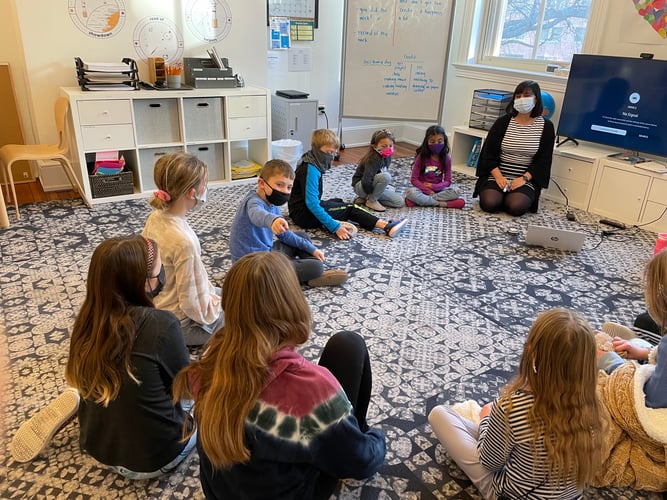
As part of orienting new parents to Acton Academy’s unique approach, we host Acton Parent Journey Meetings throughout the year. Topics have included Introduction to the Hero’s Journey, Growth Mindset, and Introduction to Socratic Guiding, the first topic of the 2021-22 school year. For this session, parents learned by doing, participating in a Socratic discussion just like their elementary and middle school children, and playing a “Never Answer a Question” game to practice being Socratic.
Experiencing a Socratic Discussion
In the Socratic discussion, parents stood in the shoes of Elon Musk in 2015 during his quest to land the first rocket upright on a landing platform—something experts said couldn’t be done. After three rocket crashes costing $61 million, parents debated whether Elon should raise more money for more rocket launches (possibly losing more people's money if the rockets fail), or whether he should give up so no one else loses money.
By a 6-1 margin, parents voted to raise more money. But guess what? The next three rockets crashed. Parents were asked, should they (in the shoes of Musk) try to raise even more money, or should they quit? As the stakes got higher, parents wrestled with tough questions such as whether to keep raising money forever or is there a point when quitting is good? How does one know? Is failure a requirement for success?
Debriefing on the discussion, parents reflected on the “why” behind Socratic discussions. There are five main reasons Acton uses Socratic discussions to launch each day: storytelling, decision-making, character, respect, and judgment.
Storytelling: Human beings are storytelling creatures and children are fascinated by stories. Children learn through the heroic stories of real people in the real world.
Decision-making: Children practice taking a stand. They learn to be decisive, brave, and willing to back up their points.
Character: Children consider character traits in real people—courage, resolve, kindness, empathy—particularly in scenarios where the stakes are high and the choices are not easy. This allows learners to reflect on, practice, and develop their own character.
Respect: People have different points of view. Children are curious about what someone else thinks and why. They might even change their minds after hearing another point of view or argument. In Socratic discussions, children learn to agree and disagree respectfully. They also learn to respect different points of view.
Judgment: Over time, the practice of good decision-making in many different scenarios leads to wise judgment. Children learn to exercise good judgment because they are able to come up with choices and arguments for what to do and weigh the evidence to make a decision.
Answering Questions Socratically
Next, parents played a “Never Answer a Question” game. Parents learned some of the tools and tactics of Socratic guides and practiced using them in parent scenarios.
At Acton, guides answer questions Socratically. This means they will use various Socratic strategies, giving just enough information to allow children to answer questions themselves. For instance, guides offer choices, offer clues, observe, show curiosity, affirm, or provide a boundary.
Of course, being an Acton parent doesn’t mean always answering questions Socratically. Sometimes a clear answer is necessary. The idea of the “Never Answer a Question” game was to challenge parents to incorporate some of these Socratic tools and tactics into their own parenting toolkit.
If you’d like to learn more about Socratic guiding, we highly recommend two books:
- Education for Judgment: The Artistry of Discussion Leadership by C. Roland Christensen, David A. Garvin, and Ann Sweet
- Choice Words: How Our Language Affects Children's Learning by Peter H. Johnston